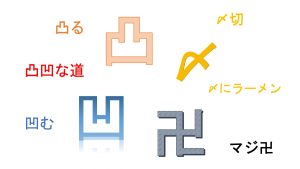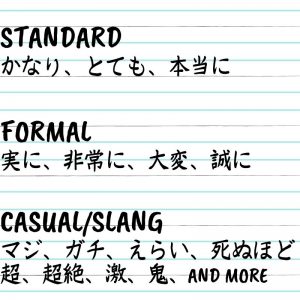This post introduces confusing Japanese kanji words that have two different readings and meanings. For each word, there is a unique example sentence that contains both usages in the same context. When you encounter these words in a text, make sure you always take the context into account to confirm their meaning/reading.
Table of Contents
辛い
Reading/Meaning
- からい, “hot, spicy”
- つらい, “tough, hard, painful”
Example
辛(から)い食べ物だけを1時間食べ続けるなんて、私には辛(つら)すぎる。
It is too painful for me to keep eating only spicy food for one hour.
Additional Note
For some people, eating spicy (からい) food can be quite painful (つらい). Furthermore, there is also a similar-looking kanji “幸”, which means “happiness” as in 幸 (しあわ)せ and 幸福(こうふく).
空く/空いている
Reading/Meaning
- あく/あいている, “become/be vacant, free, not occupied”
- すく/すいている, “become/be uncrowded, unbusy, empty”
Example
急に予定が空(あ)いたので有名なラーメン屋に行ってみたら、結構空(す)いていてよかった。
Since my schedule suddenly became clear, I went to a famous ramen restaurant and it wasn’t very crowded, which was good.
Additional Note
Don’t confuse “空(あ)いている” with “開(あ)いている”, which means “(shop is) open/available for business”. For instance, the Japanese translation of “This shop is open” is “この店は開いている“, not “空いている“. In fact, (この店は)空いている reads “(このみせは)すいている” and means “This shop is empty/not crowded“. Very confusing, isn’t it?
Here are more examples that would help you understand 空く and 空く better: 空く is used in 明日空いている? (“Are you free tomorrow?”) and 席が空く (“The seat becomes free”). On the other hand, 空く is used in お腹が空く (“stomach becomes empty”) and 空いてる時間帯 (“unbusy time zone”).
臭い
Reading/Meaning
- くさい, “be smelly” (i-adj)
- におい, “bad smell” (noun)
Example
部屋が少し臭(くさ)い気がしたから、臭(にお)いを消すために消臭(しょうしゅう)スプレーを買った。
Because I felt my room was a bit smelly, I bought deodorising spray to remove the bad smell.
Additional Note
In fact, におい has two kanjis: 臭い and 匂い. Generally, the former means “bad smell”, and the latter “good smell” (e.g. “トイレの臭い” vs “香水の匂い”). Of course, you don’t have to worry about their differences in speech.
今日
Reading/Meaning
- きょう, “today”
- こんにち, “nowadays” (advanced)
Example
今日(きょう)の夜9時に、今日(こんにち)の日本が抱える社会問題を議論する番組があるらしい。
I’ve heard there will be a TV show at 9 pm today that discusses social issues Japan is facing nowadays.
Additional Note
今日(こんにち) is a rather formal word and used in formal speech/writing.
一日
Reading/Meaning
- いちにち, “one day”
- ついたち, “the 1st day of a month”
Example
4月1日(ついたち)に試験があるので、それまで一日(いちにち)も休まずに勉強するつもりだ。
As I have exams on the 1st of April, I will be studying by then without taking a single day off.
Additional Note
The 1st of January (1月 1日) is called 元旦 (がんたん). There are also other dates of a month that have special readings, e.g. 20日 (はつか). See more at Japanese Kanji Words with Irregular/Special Readings.
人気
Reading/Meaning
- にんき, “popular/popularity”
- ひとけ, “signal of people being around” (advanced)
Example
人気(にんき)のラーメン屋が、この人気(ひとけ)のない場所にポツンとある。
A popular ramen restaurant is at this desolate place isolatedly.
Additional Note
人気 (ひとけ) is usually used in the phrase “人気のない/少ない”. However, don’t judge too early as 人気のない can also read “にんきのない” and mean “not popular” (well, actually this reading/meaning is more dominant). One rule of thumb is that if the phrase is followed by a noun like 場所 (“place”) or 通り (“street”), it would be ひとけ.
大事
Reading/Meaning
- だいじ, “important, precious” (na-adj)
- おおごと, “a big thing/deal/issue, serious matter” (noun, advanced)
Example
大事(だいじ)な本が盗まれたと先生に嘘をついたら、大事(おおごと)になってしまい今とても後悔している。
I lied to my teacher, saying the book I cherished had been stolen, and now I really regret doing that because it (unexpectedly) became a big issue.
Additional Note
大事(おおごと) usually contains the connotation that the thing unwantedly becomes a big deal/issue, and therefore it is often used in phrases like “大事になる前に (before it turns into a big deal/problem)” or “大事にしたくない (don’t want to make it a big deal)”. Note that, in some cases, the first reading is also used with the second definition.
最中
Reading/Meaning
- さいちゅう, “when (one is doing something/something is happening)”
- もなか, “Monaka” (Japanese sweet made of azuki bean paste)
Example
最中(もなか)を食べている最中(さいちゅう)に話しかけられたので、答えられなかった。
Because I was spoken to when eating Monaka, I couldn’t answer.
Additional Note
In fact, 最中 has another reading, “さなか”, which means almost the same as さいちゅう.
十八番
Reading/Meaning
- じゅうはちばん, “number 18”
- おはこ, “forte, adept skills”; “songs one sings very well” (advanced)
(* The first reading じゅうはちばん is also used with the second definition sometimes.)
Example
背番号十八番(じゅうはちばん)をつけたこのピッチャーの十八番(おはこ)は、うまく緩急をつけたピッチングだ。
The forte of this pitcher wearing uniform number 18 is his pitching style that mixes both fastballs and off-speed pitches effectively.
Additional Note
Whether related to the second meaning or not, the number 18 is considered as an ace (i.e. No. 1 pitcher) uniform number in Japanese baseball (野球), and therefore it is one of the most popular numbers among both professional and amateur baseball pitchers.
Also, note that 十八番 also has another meaning: “songs that one sings very well” as described above; see the post 十八番 (ohako) Meaning “The Songs You Sing the Best” to learn more.
被る
Reading/Meaning
- かぶる, “wear (a hat)”
- こうむる, “suffer/receive something negative” (advanced)
Example
スモモの木の下で帽子を被(かぶ)り直したら、スモモを盗んでいると疑がわれるという不運を被(こうむ)る羽目になってしまった。
I re-wore my hat under an Asian plum tree, and I ended up having such bad luck that I was suspected of stealing the plums (and hiding them inside my hat).
Additional Note
The content of the example sentence above is cited from a famous Chinese idiom/poem (“瓜田不納履、李下不正冠”), which admonishes you to always avoid situations where you are suspected of doing something wrong, regardless of whether you’re innocent or not.
The words that frequently collocate with 被(こうむ)る include 損失 (そんしつ, “loss”) and 不利益 (ふりえき, “disbenefit”). Sometimes, it is also used with positive words (e.g. 恩恵を被(こうむ)る, “receive benefits”) but that’s much rarer. The second definition/reading of 被る is not very common itself, and yet is often used in other words such as 被災する (ひさいする, “suffer a disaster”), 被害 (ひがい, “damage one suffers”), and 被告人 (ひこくにん, “defendant”).
***
The following kanji words have both “correct” and “incorrect” readings, with the latter representing how the words are actually pronounced in speech. On Japanese exams, you should always write the correct reading, but otherwise, it is more natural to use the “incorrect” pronunciation. In fact, a lot of typing systems accept both readings to convert hiragana to kanji.
***
体育
Meaning
Physical Education (PE)
Reading
- たいいく (correct)
- * たいく (incorrect yet more common pronunciation in speech)
Example
俺の得意科目は体育(たいいく, usually pronounced as たいく)だ。
The subject I’m good at is PE.
Additional Note
Similarly, 体育館(たいいくかん, “school gymnasium”) is usually pronounced as たいくかん.
唯一
Meaning
only; sole(ly)
Reading
- ゆいいつ (correct)
- * ゆいつ (incorrect yet more common pronunciation in speech)
Example
このホテルにはあまり満足しなかった。唯一良かったのは、立地が良かったことだ。
I wasn’t quite satisfied with this hotel. The only saving grace was its good location.
cf: 唯一無二
https://takashionary.com/glossary/yuiitsu-muni/
雰囲気
Meaning
vibe, atmosphere
Reading
- ふんいき (correct)
- * ふいんき (incorrect yet more common pronunciation in speech)
Example
このレストランは雰囲気(ふんいき, usually pronounced as ふいんき)が良い。
This restaurant has a good vibe
Additional Note
雰囲気 is usually pronounced as ふいんき simply because it’s easier to say than the correct reading (try pronouncing them yourself). Incidentally, there is an interesting slang word “雰囲気イケメン”, which literally means “handsome-vibe man”. See the following post for more details.
“雰囲気イケメン (fuinki ikemen) Meaning ‘Handsome-Vibe Man’ in Japanese Slang”





Leave a Reply